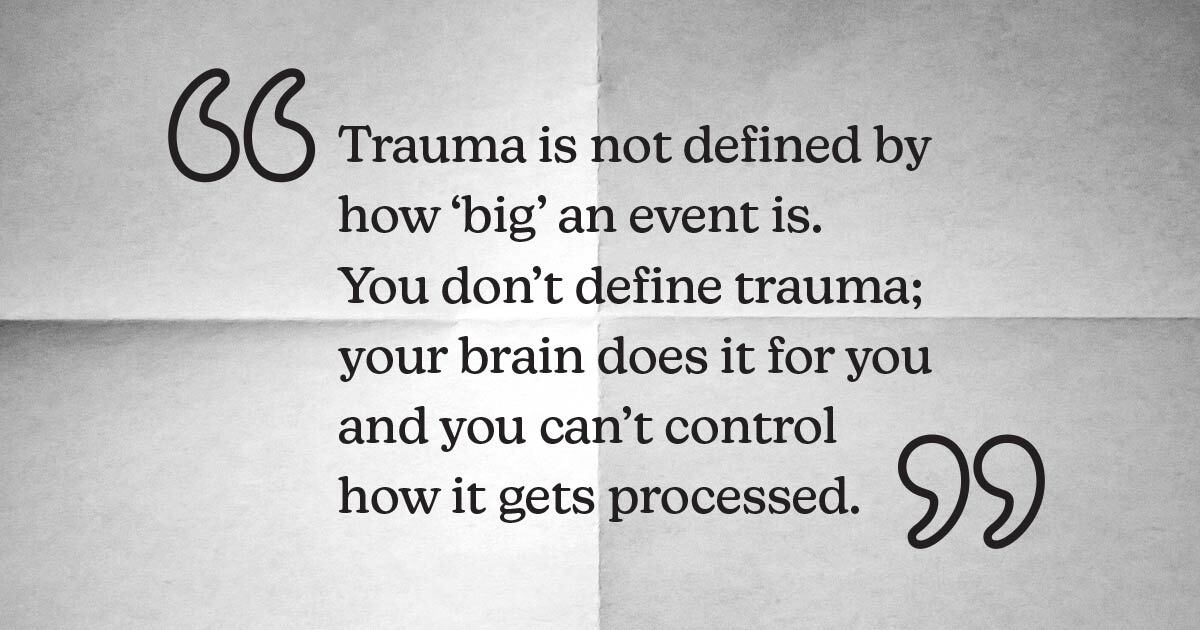Six years ago, I started seeing a psychologist for help managing my self-diagnosed depression and anxiety. But she had news for me. She told me my struggles were related to a different diagnosis—PTSD.
Diagnoses of depression and anxiety were easier for me to accept. My own mind holds much less of a stigma towards those two words. It was the word trauma that I was stuck on and struggling to accept. To me, trauma was people living in war-torn countries in the depths of abject poverty surrounded by death and danger. Trauma was people being regularly abused by someone who supposedly loved them. Trauma was chronic neglect: kids with dirty clothes that didn’t fit, who were never fed a healthy meal, whose guardians just didn’t bother to come home. Trauma was people in the military facing life-or-death conflicts all around the world.
None of these definitions I had for the word trauma fit my experiences. So, how could I possibly have PTSD? It didn’t matter that I could look at the list of symptoms and see almost all of them reflected in myself. I had parents. I had clean clothes that fit properly. I always had a roof over my head. I had adequate food. To me, my negative experiences had not been “bad enough” to warrant the use of the word trauma.

See, there was a lot of change in my younger life. And that frequent change filled me with an overwhelming feeling of chaos. That overwhelming chaos created a strong need to feel in control of situations. I sought a sense of control in various ways, including blaming myself for all the things that had happened to me, especially the bad things. If I could blame myself for the bad things, if I could convince myself these things were my fault, then at least I was the one behind the wheel. And if these things were my fault, how could they possibly be traumatic? They were simply a matter of cause and effect.
It wasn’t until I started working with my current therapist that I began to learn how to accept this diagnosis. “Trauma is not defined by how ‘big’ an event is. You don’t define trauma; your brain does it for you and you can’t control how it gets processed,” she explained. Those were the words I needed to hear. Those words gave me permission to let go of the responsibility—to let go of the blame.
So now, instead of fighting against my diagnosis, I am learning to accept it. I am learning to use the word trauma in relationship to my past without feeling guilty. Just because my trauma is not the same as other people’s trauma, it does not make mine any less valid. This, in turn, is helping me slowly let go of the blame I placed on myself for the actual things that happened. And yes, it might be happening slowly, but it is happening and there is finally healing.
You’re more than your pain, more than what happened. You are strong enough to heal from the heavy you carry. We encourage you to use TWLOHA’s FIND HELP Tool to locate professional help and to read more stories like this one here. If you reside outside of the US, please browse our growing International Resources database. You can also text TWLOHA to 741741 to be connected for free, 24/7 to a trained Crisis Text Line counselor. If it’s encouragement or a listening ear that you need, email our team at [email protected].
Audrey Beaudoin
Thank you so much for this article. I for a long time struggled with PTSD symptoms but never actually allowed myself to accept a PTSD diagnosis because my trauma wasn’t “bad enough” so I really relate. I love how you explained that our brain is what defines our trauma. Thank you for sharing your story!
Kaitie
Wow. I had a moment of panic thinking I must have somehow blacked out, wrote this article, and submitted it. I’ve been trying to get to that point of acceptance for over a year since being diagnosed with PTSD. I’m not quite there yet, but I feel like this article moved me quite a bit closer than I’ve been able to do on my own. Thank you so, so much for that gift, Jennica.
Julia
This resonates and feels freeing. My brain processes trauma at different rates, my brain decides what is traumatic. It’s not about a scale or anything like that. It just is. Thank you for putting this into words to help others in the process.
Emily V
I just got diagnosed with PTSD at eating disorder treatment. I strongly relate with not feeling like my experiences were bad enough. Maybe, that I was even making it all up. Depression and anxiety also do feel easier to accept. I also had a very severe narrative of what PTSD was “supposed” to look like and so I never even imagined having PTSD.
However, after taking the assessment, I feel so much relief and validation. I don’t have an official diagnosis but I don’t know if I need one per say. I’m starting CPT soon and really eager to start this work that should have been done six years ago. Thank you for sharing and for your vulnerability. I’m so glad you are doing this work for yourself.